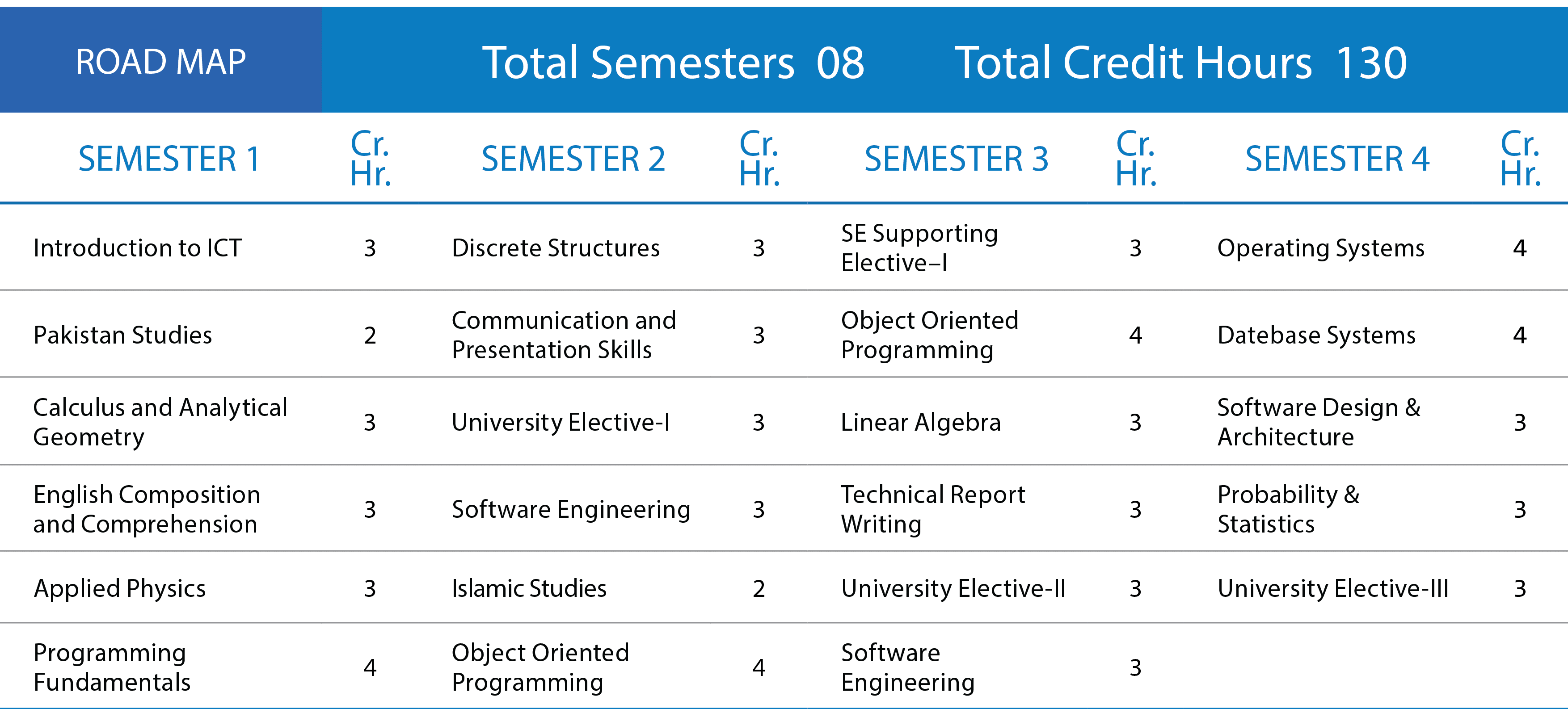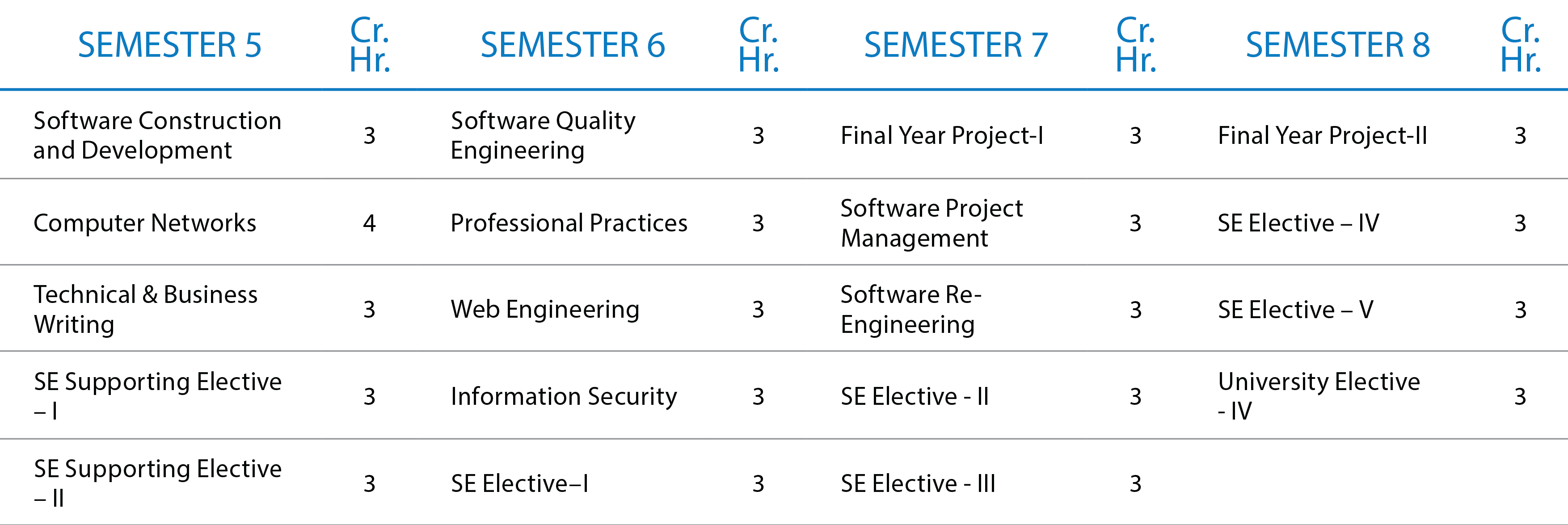
FACULTY OF COMPUTER SCIENCES
Bachelor of Science in Software Engineering
Department
Software Engineering
Level
Undergraduate
Semesters
08
Credit
136
INTRODUCTION
In the Department of Software Engineering and Computer Applications, we welcome you to a world characterized by in-demand skills of the industry. It is one of the most thriving departments at Ibadat International University, Islamabad. The department is committed to achieve excellence in teaching and inculcating confidence in students. The principle goal is to engage students in the latest technologies and skills by exposing them to the committed faculty and well-equipped labs. Our objective is to cultivate their technical and leadership abilities.
We feel it is our responsibility to inspire students, equip students with sufficient analytical, design and software engineering skills. We strive to build their character so they may contribute to nation-building with dedication, diligence, and professionalism. Our degree program is duly accredited and recognized by the National Computing Education Accreditation Council (NCEAC). The innovative ecosystem that we have built at the department is based on bilateral engagement with the industry. As a result of our training, you’ll become a cutting-edge tech player capable of taking the world to new heights.
Dr. Muhammad Yaqoob Wani
- Program Duration
- Entry Requirements
Program Duration: 4 Years
Timing: Morning (Monday-Friday)
Location: 6.7 Km Japan Road, Sihala, Islamabad.
Recognized By: Higher Education Commission, NCEAC
Entry Requirement: 12 Years of Education, Intermediate, FA/F.Sc (Pre-Engineering, Pre-Medical)/ICS/I.Com, A-Levels, DAE or equivalent (minimum 50% marks). Candidates having FSc with minimum 50% marks are also eligible for admission but according to National Computing Education Accreditation Council (NCEAC) of HEC such students must pass deficiency courses of Mathematics of
6 credit hours within one year.
Entry Test: IBADAT International University Entry test / NAT
CAREER PROSPECTUS
This program is designed to prepare our students for a career as Software Engineers; System Analysts, Requirements Engineers, Software Architects, Quality Analysts, and Project managers. Software Engineers will help to develop software for telecommunications, financial systems, aeronautics, medical devices, transportation systems, banking and various government organizations.
MISSION STATEMENT
The mission of the Bachelor of Software Engineering program is “to deliver quality education that equips students with critical thinking, research capabilities, and transferable skills, fostering socially and ethically responsible Software Engineering graduates who are dedicated to professional development and continuous growth.”
The keywords of the program mission are highlighted and are used in the following section.
PROGRAM EDUCATIONAL OBJECTIVES (PEOS)
Graduates from the Software Engineering program are expected to attain or achieve the following Program Educational Objectives:
PEO-1 Learn and apply a systematic, disciplined and quantifiable approach to the design, development, operation, and maintenance of software systems.
PEO-2 Design and implement large, reliable, efficient and economical software by applying the principles and practices of software engineering and communicate to the stakeholders.
PEO-3 Be well versed in all aspects of software life cycle from specification through analysis and design to testing, maintenance and evolution of software product as individual, team member, or as a lead
PROGRAM LEARNING OUTCOMES (PLOS)
PLO – 1 Academic Education: Following an accredited program of study designed to prepare graduates as software engineering professionals.
PLO – 2 Knowledge for Solving Software Engineering Problems: Apply knowledge of software engineering fundamentals and specialization, mathematics, computer science, and domain knowledge appropriate for abstraction and conceptualization of software engineering solution models.
PLO – 3 Problem Analysis: Identify, survey literature, and formulate complex software engineering problems to reach at substantiated conclusions using fundamental principles of mathematics, software engineering and computer science, and relevant domain disciplines.
PLO – 4 Design/ Development of Solutions: Design and evaluate solutions for complex software engineering problems, and develop and evaluate software systems, components, or processes that meet specified user needs with appropriate consideration for public health and safety, cultural, societal, and environmental considerations.
PLO – 5 Modern Tool Usage: Create, select, adapt and apply appropriate techniques, resources, and modern software engineering tools to complex software engineering activities, with an understanding of the scope of tools and technologies.
PLO – 6 Individual and Team Work: Function effectively as an individual and as a member or leader in diverse teams and in multi-disciplinary settings.
PLO – 7 Communication: Communicate effectively with the software engineering community and with society at large about complex software engineering activities by being able to comprehend and write effective reports, design documentation, make effective presentations, and give and understand clear instructions.
PLO – 8 Software Engineering Professionalism and Society: Understand and assess societal, health, safety, legal, and cultural issues within local and global contexts, and the consequential responsibilities relevant to professional software engineering practice.
PLO – 9 Ethics: Understand and commit to professional ethics, responsibilities, and norms of software engineering profession.
PLO – 10 Life-long Learning: Recognize the need, and have the ability, to engage in independent learning for continual development as a software engineering professional.
Mapping of PEOs with PLOs
Mapping of PEOs with PLO
| Program Learning Outcomes | Program Educational Objective | |||
| PEO-1 | PEO-2 | PEO-3 | ||
| PLO-1 | Academic Education | ✓ | ||
| PLO-2 | Knowledge for Solving Computing Problems | ✓ | ||
| PLO-3 | Problem Analysis | ✓ | ||
| PLO-4 | Design/ Development of Solutions | ✓ | ||
| PLO-5 | Modern Tool Usage | ✓ | ||
| PLO-6 | Individual and Team Work | ✓ | ||
| PLO-7 | Communication | ✓ | ||
| PLO-8 | Computing Professionalism and Society | ✓ | ||
| PLO-9 | Ethics | ✓ | ||
| PLO-10 | Life-long Learning | ✓ | ||




